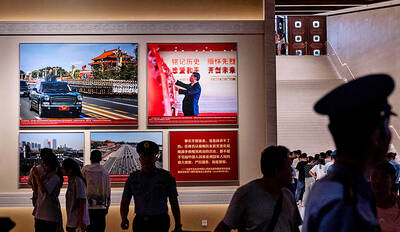The Control Yuan yesterday issued "corrective measures" to the Ministry of National Defense (MND) over its handling of the establishment of Taiwan Goal, an arms-dealing firm set up by the Democratic Progressive Party (DPP) government last January that was disbanded after it became the subject of controversy.
The MND was charged with violating laws and regulations governing the separation of power between the military's command, administration and armaments bureaus.
Control Yuan members also charged the MND over its initial plan to fund 45 percent, or NT$90 million (US$2.7 million), of Taiwan Goal, as the MND is required by laws and regulations to keep any investment at less than 35 percent.
The rebuke also addressed the MND's failure to give a clear account of plans for the company.
Under Control Yuan regulations, the ministry now has two months to act upon the measures and make appropriate improvements to its operational procedures.
Former premier Chang Chun-hsiung (張俊雄) confirmed the existence of Taiwan Goal last February.
Chinese Nationalist Party (KMT) lawmakers alleged the company was a vehicle for the DPP to make profits from arms trading as Wu Nai-jen (吳乃仁), a DPP stalwart, had been appointed president of the company.
The KMT alleged former vice premier Chiou I-jen (邱義仁) was in charge of establishing the company at the behest of former president Chen Shui-bian (陳水扁). Former MND minister Lee Tien-yu (燠毞迼) resigned amid the mounting controversy.
At a press conference, Control Yuan President Wang Chien-shien (卼膘嬧) was asked by reporters why no MND officials had been held accountable for the matter. Wang said the Control Yuan did not find any irregularities involving officials and could not impeach officials without solid evidence.
Control Yuan members found that Taiwan Goal was established based on instructions given by Chen at a meeting with the military on July 29, 2005.

Three batches of banana sauce imported from the Philippines were intercepted at the border after they were found to contain the banned industrial dye Orange G, the Food and Drug Administration (FDA) said yesterday. From today through Sept. 2 next year, all seasoning sauces from the Philippines are to be subject to the FDA’s strictest border inspection, meaning 100 percent testing for illegal dyes before entry is allowed, it said in a statement. Orange G is an industrial coloring agent that is not permitted for food use in Taiwan or internationally, said Cheng Wei-chih (鄭維智), head of the FDA’s Northern Center for

The Chinese military has built landing bridge ships designed to expand its amphibious options for a potential assault on Taiwan, but their combat effectiveness is limited due to their high vulnerability, a defense expert said in an analysis published on Monday. Shen Ming-shih (沈明室), a research fellow at the Institute for National Defense and Security Research, said that the deployment of such vessels as part of the Chinese People’s Liberation Army (PLA) Navy’s East Sea Fleet signals a strong focus on Taiwan. However, the ships are highly vulnerable to precision strikes, which means they could be destroyed before they achieve their intended

About 4.2 million tourist arrivals were recorded in the first half of this year, a 10 percent increase from the same period last year, the Tourism Administration said yesterday. The growth continues to be consistent, with the fourth quarter of this year expected to be the peak in Taiwan, the agency said, adding that it plans to promote Taiwan overseas via partnerships and major events. From January to June, 9.14 million international departures were recorded from Taiwan, an 11 percent increase from the same period last year, with 3.3 million headed for Japan, 1.52 million for China and 832,962 to South Korea,

REWRITING HISTORY: China has been advocating a ‘correct’ interpretation of the victory over Japan that brings the CCP’s contributions to the forefront, an expert said An elderly Chinese war veteran’s shin still bears the mark of a bullet wound he sustained when fighting the Japanese as a teenager, a year before the end of World War II. Eighty years on, Li Jinshui’s scar remains as testimony to the bravery of Chinese troops in a conflict that killed millions of their people. However, the story behind China’s overthrow of the brutal Japanese occupation is deeply contested. Historians broadly agree that credit for victory lies primarily with the Chinese Nationalist Party (KMT)-led Republic of China (ROC) Army. Its leader, Chiang Kai-shek (蔣介石), fled to Taiwan in 1949 after losing a